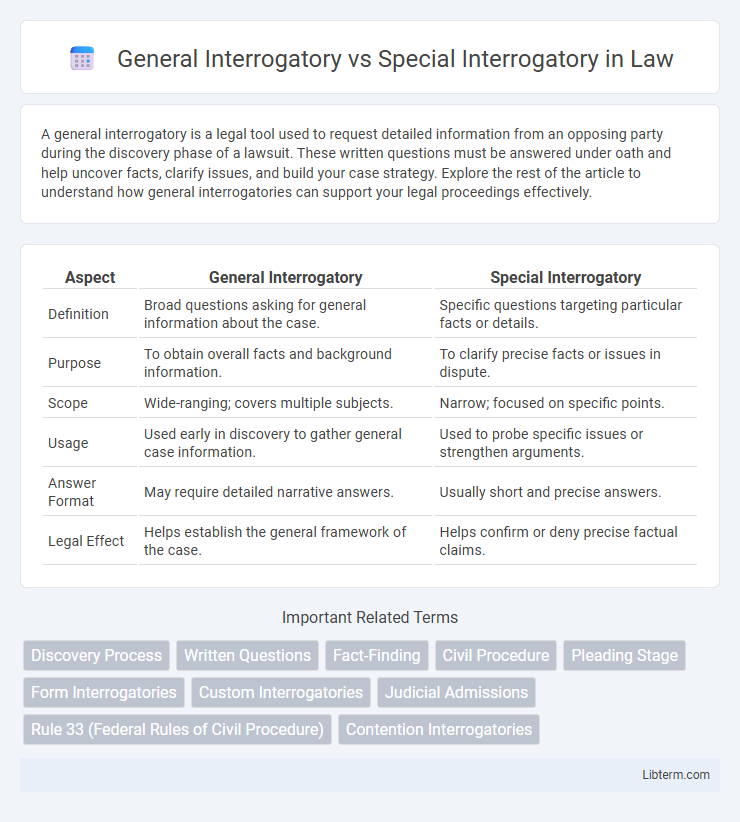A general interrogatory is a legal tool used to request detailed information from an opposing party during the discovery phase of a lawsuit. These written questions must be answered under oath and help uncover facts, clarify issues, and build your case strategy. Explore the rest of the article to understand how general interrogatories can support your legal proceedings effectively.
Table of Comparison
| Aspect | General Interrogatory | Special Interrogatory |
|---|---|---|
| Definition | Broad questions asking for general information about the case. | Specific questions targeting particular facts or details. |
| Purpose | To obtain overall facts and background information. | To clarify precise facts or issues in dispute. |
| Scope | Wide-ranging; covers multiple subjects. | Narrow; focused on specific points. |
| Usage | Used early in discovery to gather general case information. | Used to probe specific issues or strengthen arguments. |
| Answer Format | May require detailed narrative answers. | Usually short and precise answers. |
| Legal Effect | Helps establish the general framework of the case. | Helps confirm or deny precise factual claims. |
Introduction to Interrogatories
Interrogatories are written questions submitted by one party to another during the discovery phase of litigation to gather relevant information and clarify facts. General Interrogatories consist of broad, standardized questions applicable to a wide range of cases, making them efficient for obtaining basic information quickly. Special Interrogatories are tailored, case-specific questions designed to address unique aspects of a case, providing detailed and precise information essential for complex legal matters.
Definition of General Interrogatory
General interrogatories consist of broad, pre-formulated questions applicable to a wide range of cases, designed to gather foundational information from the opposing party in litigation. These interrogatories address general facts and issues related to the case, such as identity, relationship, or document production, rather than specific details. General interrogatories streamline the discovery process by allowing the requesting party to obtain essential information efficiently before proceeding to more specialized inquiries like special interrogatories.
Definition of Special Interrogatory
Special Interrogatories are precise, written questions directed at a party in litigation to obtain detailed information relevant to specific issues in a case, often limited in number by court rules. Unlike General Interrogatories, which cover broad and standard topics, Special Interrogatories focus on particular facts or events, enabling a targeted fact-finding process. Courts typically enforce restrictions on Special Interrogatories to prevent excessive or burdensome inquiries, ensuring efficient discovery.
Key Differences Between General and Special Interrogatories
General interrogatories request broad information or facts relevant to the case, allowing for open-ended responses that provide an overview of a party's knowledge. Special interrogatories seek specific, detailed information or precise facts, often requiring concise, focused answers related to particular issues in the litigation. The primary difference lies in their scope and purpose: general interrogatories explore overarching themes, while special interrogatories target exact details critical for case development.
Legal Purpose of Each Interrogatory Type
General interrogatories serve the legal purpose of gathering broad, foundational information from a party in litigation, enabling a comprehensive understanding of the case's context. Special interrogatories are designed to elicit specific, detailed facts or clarify particular issues critical to the legal dispute, often narrowing the scope for precise discovery. Both interrogatory types strategically facilitate evidence collection to support case preparation and trial readiness.
Drafting Effective General Interrogatories
Effective general interrogatories are designed to elicit broad, foundational information from parties in litigation, ensuring comprehensive coverage without overstepping the scope of permissible discovery. Drafting precise and clear questions that avoid ambiguity increases the likelihood of obtaining useful and relevant responses while minimizing objections. Incorporating key legal terminology and targeting specific factual or procedural topics enhances the strategic value of general interrogatories in case preparation.
Crafting Targeted Special Interrogatories
Crafting targeted Special Interrogatories requires precise and detailed questions designed to elicit specific facts related to a case, contrasting with General Interrogatories that cover broad, general information. Special Interrogatories enhance discovery efficiency by focusing on particular issues, enabling attorneys to obtain tailored admissions or denials critical for trial preparation. Effective use of Special Interrogatories demands careful legal analysis to avoid ambiguity and ensure relevance to the claims or defenses at hand.
Advantages and Disadvantages of General Interrogatories
General interrogatories offer the advantage of allowing broad and flexible questioning across multiple issues in a single set, reducing preparation time and streamlining the discovery process. However, their lack of specificity can lead to vague or overly broad answers, requiring additional follow-up and potentially increasing overall litigation costs. Compared to special interrogatories, general interrogatories may produce less precise information, limiting their effectiveness in complex cases that demand detailed and focused responses.
Pros and Cons of Special Interrogatories
Special Interrogatories provide the advantage of detailed, specific inquiries tailored to the unique facts of a case, allowing parties to obtain precise and relevant information essential for litigation strategy. However, their con lies in the limited number that can be served according to jurisdictional rules, which may restrict comprehensive discovery and necessitate prioritization of key issues. The specificity demands careful drafting to avoid objections and ensure clarity, which can increase preparation time and legal costs compared to general interrogatories.
Best Practices for Using Interrogatories in Civil Litigation
General Interrogatories provide broad questions applicable to various cases, while Special Interrogatories target specific issues unique to the litigation. Best practices recommend tailoring Special Interrogatories to obtain precise facts and avoid objections, ensuring relevance and clarity in responses. Combining both types effectively streamlines discovery, supports case strategy, and minimizes delays in civil litigation proceedings.
General Interrogatory Infographic

 libterm.com
libterm.com